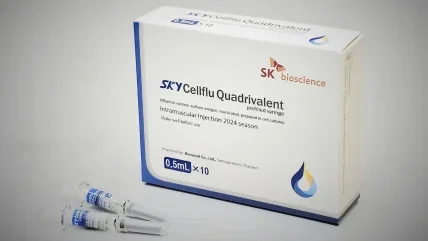
SK bioscience, a vaccine and biotech company, announced that Indonesia’s BPOM (Badan Pengawas Obat dan Makanan) has approved its SKYCellflu Quadrivalent prefilled syringe.
The Indonesian food and drug Agency has approved SKYCellflu’s biologics licence application (BLA) for influenza.
According to SK bioscience, the approval marks the world’s first quadrivalent cell-cultured influenza vaccine. It is also the first domestically produced influenza vaccine to be approved in Indonesia.
Indonesia’s geography, spanning both the Northern and Southern Hemispheres, makes it subject to the World Health Organization’s flu vaccination guidelines for both regions.
Following the approval of SKYCellflu for Northern Hemisphere influenza strains, SK bioscience expects a fast-tracked approval for Southern Hemisphere strains.
The vaccine is said to be the world’s first cell culture-based influenza vaccine to receive WHO Prequalification (PQ) certification. It demonstrated its immunogenicity and safety in clinical trials.
In addition, it is currently the only cell-cultured influenza vaccine available in Korea.
According to SK bioscience, SKYCellflu has a shorter production timeline than egg-based vaccines. This makes it suitable for rapid pandemic response and emerging variants.
It also eliminates the need for antibiotics or preservatives.
Additionally, the vaccine ensures a more accurate match to circulating influenza strains, the Korean vaccine and biotech company said.
SK bioscience CEO Jaeyong Ahn said: “It is very encouraging that our own developed vaccines are receiving approvals worldwide, a significant step for expanding our global export market.
“We are confident that SK bioscience will continue to grow into a global vaccine brand beyond Korea, as our vaccines, including shingles, chickenpox, and typhoid vaccines, are securing WHO PQ certifications and global approvals one after another.”
In its research, SK bioscience conducted 15 subcultures using both cells and fertilised eggs for SKYCellflu production.
The study found mutations in three virus proteins with the fertilised egg method, while no mutations occurred in the cells used for influenza vaccine production.
SKYCellflu has been approved in several Asian countries, including Malaysia, Thailand, Myanmar, Iran, Singapore, Pakistan, Mongolia, and Brunei.
Last year, it received approval in Chile, marking its entry into the South American market. SK bioscience aims to expand its global export markets even further.
In June, the vaccine maker unveiled plans to acquire a controlling stake in IDT Biologika, a Germany-based contract manufacturing and development organisation (CDMO).






